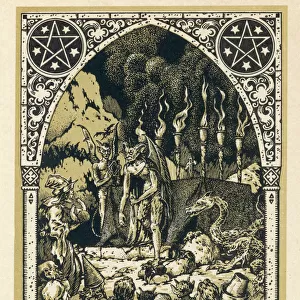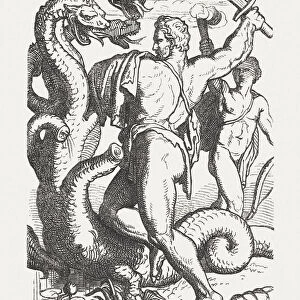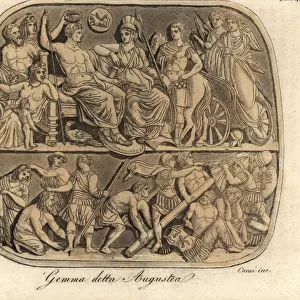Home > Animals > Mammals > Bovidae > Cattle
Herakles & Pillars

Wall Art and Photo Gifts from Mary Evans Picture Library
Herakles & Pillars
Herakles with the Pillars of Hercules which he set up on either coast of the Straits of Gibraltar when he went to steal the Cattle of Geryon
Mary Evans Picture Library makes available wonderful images created for people to enjoy over the centuries
Media ID 593129
© Mary Evans Picture Library 2015 - https://copyrighthub.org/s0/hub1/creation/maryevans/MaryEvansPictureID/10043146
Cattle Gibraltar Herakles Hercules Pillars Steal Straits Geryon Myth
FEATURES IN THESE COLLECTIONS
> Animals
> Farm
> Cattle
> Related Images
> Animals
> Mammals
> Bovidae
> Cattle
EDITORS COMMENTS
Herakles, the legendary Greek hero, is depicted in this print as he stands triumphantly between the Pillars of Hercules, marking the historic coasts where he set them up during his epic twelfth labor. According to ancient mythology, Herakles was tasked by King Eurystheus to steal the Cattle of Geryon, a formidable beast that roamed the distant lands beyond the straits. The Pillars of Hercules, also known as the Columns of Hercules or the Pillars of Heracles, are located at each end of the Straits of Gibraltar, the narrow passage that separates Europe from Africa. Herakles erected these monumental stones to mark the end of the known world and the beginning of the unknown, symbolizing the limit of the navigable sea for the ancient Greeks. This classic print beautifully captures the hero's determination and strength as he gazes out towards the vast expanse of the sea, a testament to his legendary journey. The intricate details of Herakles' muscular physique and the ornate design of the pillars are a testament to the masterful craftsmanship of the artist. The historical significance of this image is further emphasized by the presence of the mythical Cattle of Geryon in the background, represented by three horned beasts, symbolizing the hero's triumph over the impossible task set before him by King Eurystheus. This print is a stunning addition to any collection of classical mythology, history, or art, and is sure to inspire awe and admiration for the heroic deeds of Herakles and the enduring power of Greek mythology.
MADE IN THE USA
Safe Shipping with 30 Day Money Back Guarantee
FREE PERSONALISATION*
We are proud to offer a range of customisation features including Personalised Captions, Color Filters and Picture Zoom Tools
SECURE PAYMENTS
We happily accept a wide range of payment options so you can pay for the things you need in the way that is most convenient for you
* Options may vary by product and licensing agreement. Zoomed Pictures can be adjusted in the Cart.












